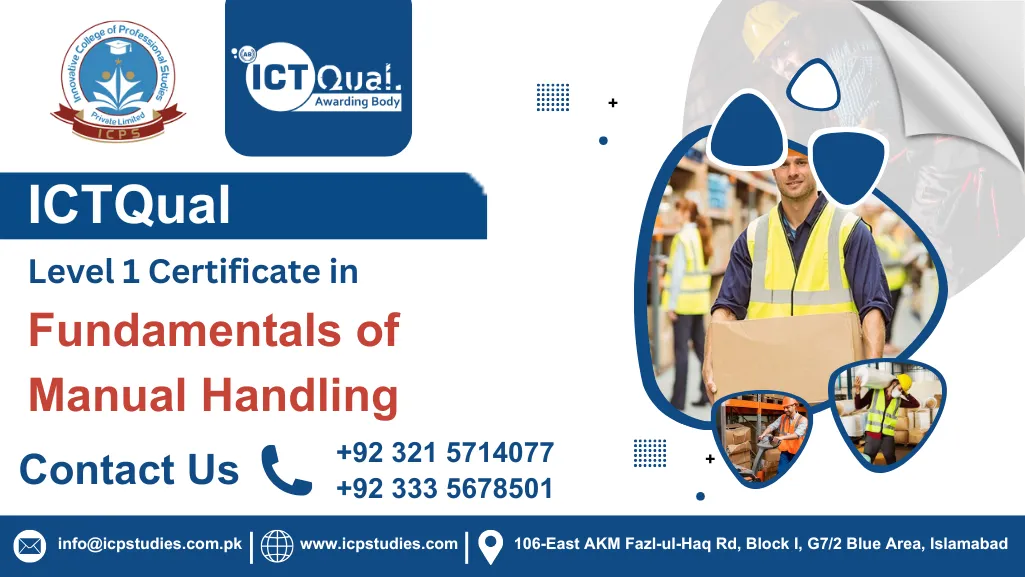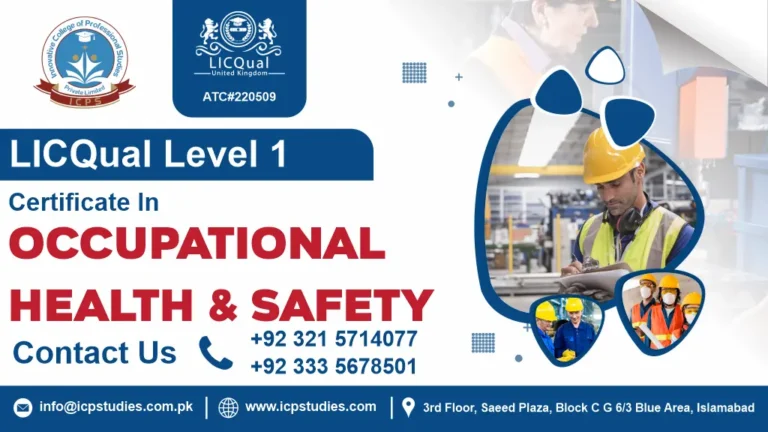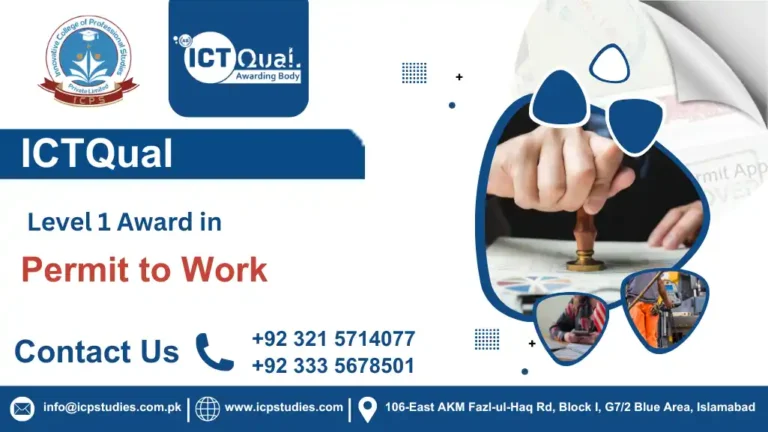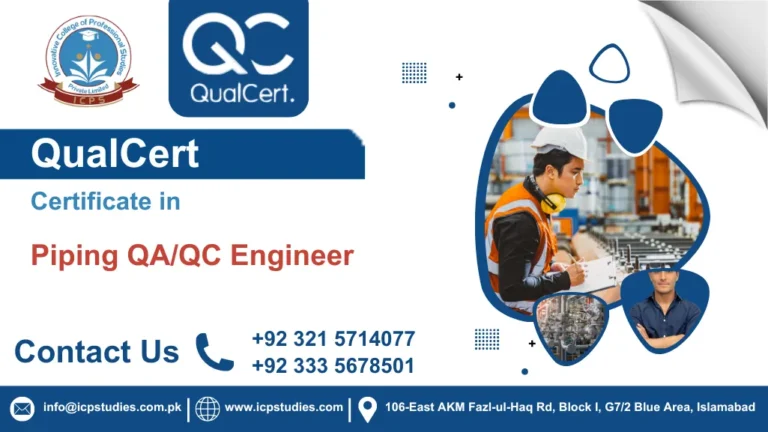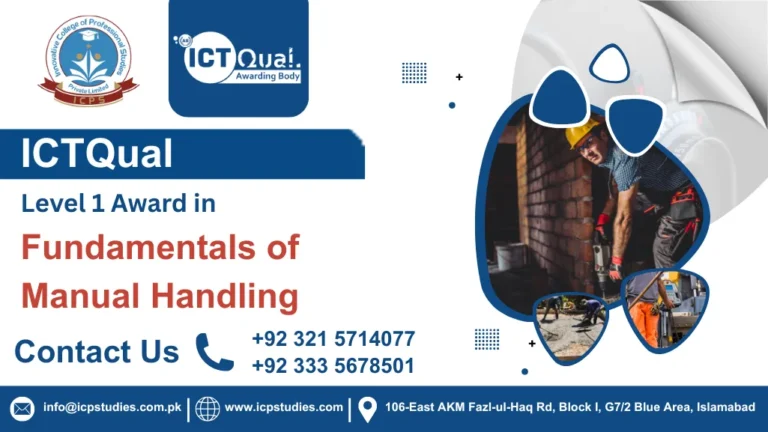Manual handling remains one of the most common causes of workplace injuries across various industries in the UK. From warehouses and construction sites to healthcare and hospitality settings, improper manual handling techniques can lead to long-term musculoskeletal disorders and increased absenteeism. The ICTQual Level 1 Certificate in Fundamentals of Manual Handling is designed to address this challenge by providing essential training on safe handling practices and legal responsibilities.
The ICTQual Level 1 Certificate in Fundamentals of Manual Handling is an entry-level qualification aimed at equipping learners with the fundamental knowledge and practical understanding required to carry out manual handling tasks safely and effectively. It is suitable for employees across all sectors, particularly those whose roles involve lifting, carrying, pushing, or pulling loads as part of their daily duties.
The ICTQual Level 1 Certificate in Fundamentals of Manual Handling is a vital training solution for any organisation committed to creating a safe and compliant workplace. With manual handling risks present in so many job roles, equipping employees with the right knowledge and skills can lead to fewer injuries, improved morale, and stronger organisational performance.
All About ICTQual Level 1 Certificate in Fundamentals of Manual Handling
Course Overview
The ICTQual Level 1 Certificate in Fundamentals of Manual Handling provides essential training for individuals involved in physical tasks across various workplace settings. This entry-level qualification is designed to build foundational knowledge of manual handling principles, focusing on how to move and handle objects safely and efficiently to minimise the risk of injury.
The course covers key topics such as the causes of manual handling injuries, risk assessment techniques, correct lifting methods, and legal responsibilities under UK health and safety laws. It is ideal for employees in sectors such as warehousing, construction, healthcare, logistics, retail, and cleaning where manual handling tasks are a routine part of the job.
Delivered through flexible online or in-person formats, the course ensures accessibility for all learners and is supported by practical examples to enhance understanding. By completing this qualification, individuals not only improve their own workplace safety but also contribute to a culture of health and safety compliance within their organisation.
Whether taken as part of induction training or professional development, the ICTQual Level 1 Certificate is a valuable asset for anyone seeking to meet legal training requirements and improve manual handling practices on the job.
Study Units
- Introduction to Manual Handling
- Risks and Hazards in Manual Handling
- Safe Lifting Techniques and Posture
- Use of Manual Handling Equipment
- Risk Assessment and Injury Prevention
To enrol in the ICTQual Level 1 Certificate in Fundamentals of Manual Handling, learners must meet the following basic entry requirements:
Language Proficiency: Learners should have a basic level of English reading and comprehension skills, ideally equivalent to CEFR Level A2 or above, to ensure they can understand course materials and safety instructions effectively.
Minimum Age: Applicants must be at least 16 years old at the time of enrolment.
Educational Background: No formal academic qualifications are required. However, a basic understanding of health and safety principles is beneficial.
Work Experience: This qualification does not require any prior work experience and is suitable for individuals who are new to manual handling roles or looking to refresh their knowledge.
The ICTQual Level 1 Certificate in Fundamentals of Manual Handling is designed to support individuals and organisations committed to promoting workplace safety. This course is suitable for:
Anyone wishing to refresh their knowledge of safe manual handling practices
New employees undertaking roles involving manual handling tasks
Workers in warehousing, logistics, construction, and manufacturing industries
Healthcare and social care staff responsible for moving patients or equipment
Cleaning and maintenance personnel required to handle tools and supplies
Retail and stockroom assistants involved in lifting and restocking
Employers seeking to meet legal health and safety training requirements
Individuals seeking to improve their employability in manual labour roles
Learning Outcomes
Introduction to Manual Handling
- Understand the basic principles and importance of manual handling
- Identify common manual handling tasks and their impact on health and safety
- Recognize legal responsibilities related to manual handling
Risks and Hazards in Manual Handling
- Identify potential risks and hazards associated with manual handling activities
- Understand the causes and consequences of manual handling injuries
- Recognize situations that increase the likelihood of injury
Safe Lifting Techniques and Posture
- Demonstrate correct lifting techniques to minimize strain and injury
- Apply proper posture principles during manual handling tasks
- Understand the role of body mechanics in preventing injury
Use of Manual Handling Equipment
- Identify different types of manual handling equipment and their purposes
- Demonstrate safe and effective use of manual handling aids and tools
- Understand maintenance and inspection procedures for equipment
Risk Assessment and Injury Prevention
- Conduct basic risk assessments for manual handling tasks
- Develop strategies to control and reduce manual handling risks
- Implement injury prevention measures in the workplace
FAQs ICTQual Level 1 Certificate in Fundamentals of Manual Handling

